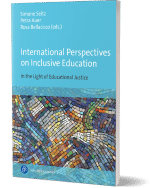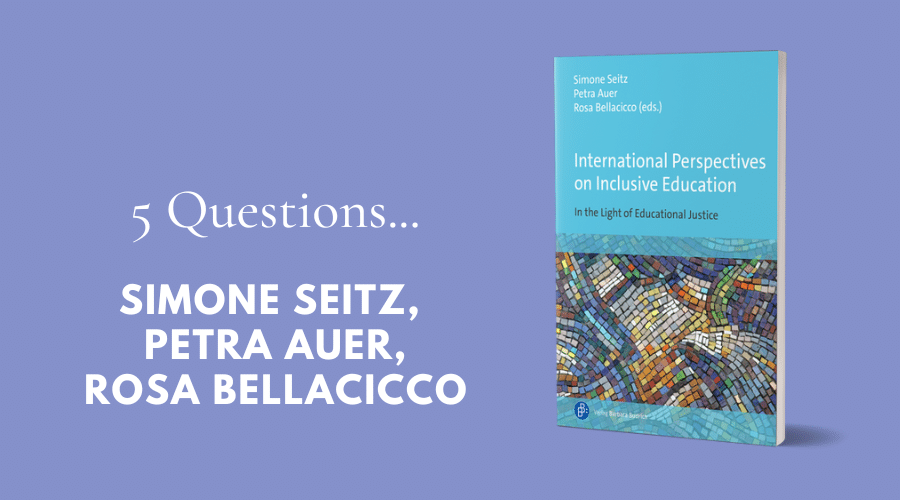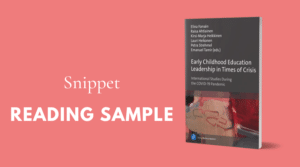International Perspectives on Inclusive Education
In the Light of Educational Justice
edited by Simone Seitz, Petra Auer and Rosa Bellacicco
About the book
International developments and impulses call for the equitable and inclusive design of education systems. This book takes this up and focuses on the often blurred relationship between inclusive education and educational equity. By compiling current research results and theoretical contributions from several European countries on the topic, the authors create an overarching framework for discussion.
What is your publication about? Could you give us a brief overview?
Our book focuses on the relationship between inclusive education and educational justice, a topical issue with still many open research questions and the need for theoretical foundations and clarifications. The volume dares to discuss some of these within an international framework, bringing together theory-based and empirical contributions from authors of various European countries. The main aim is to stimulate a deeper discussion on the relationship between the two concepts from different fields and perspectives. Of interest to researchers, academics, school personnel, students, and professionals, this book may provide an essential and significant contribution to the debate.
How did the idea for this publication come about?
The book is the outcome of international collaborations and networks of our team at the Free University of Bozen-Bolzano (Competence Centre for School Inclusion) and the shared awareness of missing research and theoretical foundations in this thematic area.
What differences in Inclusive Education can be found in different countries or regions, and which are the most striking?
Even though all European countries are influenced by the same international normative impulses –such as the Agenda 2030, which aims for high-quality and inclusive educational practice and reducing social inequity – educational realities in these countries can differ broadly. First, there can be found differences in the overall structure of the education systems linked to different qualification systems for teachers and educators.
On a more concrete level, in some nations, children starting from kindergarten share the same pathways in inclusive schools, whereas, in others, the education systems track students based on their academic performance at school – at the front stage but very often habitus-led on the backstage. Consequently, international agendas are discussed in very specific ways whereby some basic concepts like educational justice are given different meanings in policies and discourses at the national level, which is part of our motivation for the edited book.
In many areas, the COVID-19 pandemic has revealed and reinforced existing problems and inequalities. What impact has the pandemic had on Inclusive Education with regard to educational justice?
Overall, the pandemic has increased social awareness of the value of the right to education in kindergartens and schools. Around Europe, school closure and distance teaching seem to have brought about an extraordinary and unprecedented challenge, and educational inequities became more apparent as the tasks of educational institutions were handed over to families from one day to the next in most countries.
Depending on, among other things, digital developments, the responsibility for education was then returned to professionals in very different ways in different countries during the ongoing pandemic.
However, the pandemic has, for example, strengthened the promotion of broad support for qualifying teachers in universal and digital teaching and its various forms (from fully online to hybrid) since it is likely to become a part of future teaching and learning.
Which topics and challenges will research on Inclusive Education have to deal with in the near future?
In addition to the challenges already discussed, future research will have to deal, above all, with the conception of a future-oriented education that will enable future generations to deal capably and in solidarity with a whole bundle of crises and challenges, especially climate change and global conflicts. On a more concrete level, however, it is also necessary to respond to the growing institutionalisation of childhood and, for example, to design all-day educational institutions that can become places of education, life, communication, and play for children.
Short vitae:
 Dr. phil. Simone Seitz is full professor for General Didactics and Inclusive Education at the Free University of Bolzano since 2020. Before she had full professorships at the universities of Paderborn and Bremen in Germany. Her main research interests are Primary Education Research with focus on Teaching and Learning, Achievement and School Development and interwoven with research on Childhood Studies and Early Education and the Professionalisation of Teachers and Staff.
Dr. phil. Simone Seitz is full professor for General Didactics and Inclusive Education at the Free University of Bolzano since 2020. Before she had full professorships at the universities of Paderborn and Bremen in Germany. Her main research interests are Primary Education Research with focus on Teaching and Learning, Achievement and School Development and interwoven with research on Childhood Studies and Early Education and the Professionalisation of Teachers and Staff.
 Dr. Petra Auer is a research assistant at the Competence Centre for School Inclusion at the Free University of Bolzano (Italy). Overall, her research interests are in the areas of values at primary school age, inclusive education, diversity, interculturality, and acculturation.
Dr. Petra Auer is a research assistant at the Competence Centre for School Inclusion at the Free University of Bolzano (Italy). Overall, her research interests are in the areas of values at primary school age, inclusive education, diversity, interculturality, and acculturation.
 Dr. Rosa Bellacicco is a Researcher for Special and Inclusive Education at the University of Turin (Italy) and affiliated to the Competence Centre for School Inclusion at the Free University of Bolzano (Italy). Her research activities concern inclusive teaching approaches at school, the inclusion at university, ableism, and intersectionality.
Dr. Rosa Bellacicco is a Researcher for Special and Inclusive Education at the University of Turin (Italy) and affiliated to the Competence Centre for School Inclusion at the Free University of Bolzano (Italy). Her research activities concern inclusive teaching approaches at school, the inclusion at university, ableism, and intersectionality.
 You can purchase the book as a print book or e-book in our shop:
You can purchase the book as a print book or e-book in our shop:
International Perspectives on Inclusive Education
In the Light of Educational Justice
edited by Simone Seitz, Petra Auer and Rosa Bellacicco

